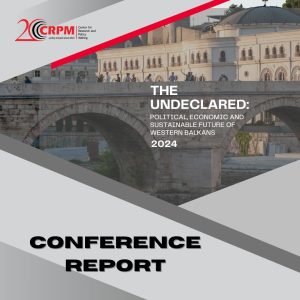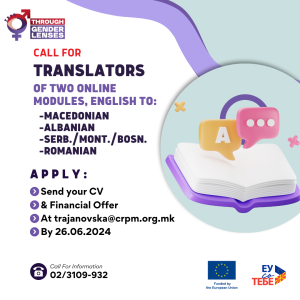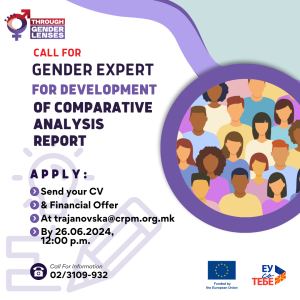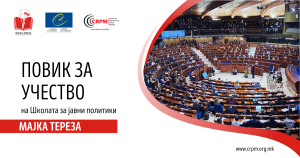STATUTE OF THE CENTER FOR RESEARCH AND POLICY MAKING – CRPM
(English Language Translation)
GENERAL PROVISIONS
Article 1
“Centre for Research and Policy Making”-CRPM Skopje is a non-profit organization that is performing policy research and analysis, adult education and public policy advocacy.
Article 2
The Association has the full official name “Center for Research and Policy Making”. The official abbreviation is: “CRPM”.
The headquarters of CRPM is located in Skopje, Cico Popovic str. 6/2-9,1000 Skopje, Macedonia.
Article 3
CRPM has been established in order to perform research and analytical activities through which policy recommendations and advise is generated in order to bring to policy change in legal, economic, cultural and other social spheres. In addition, CRPM works on development and delivery of higher education and non-formal adult education programs relevant for overall societal development of the Republic of Macedonia enhancing the multi-dimensional cooperation among other countries from the region and advancing Euro-Atlantic integrations.
Article 4
The stipulated activities and goals of CRPM are to be performed in accordance with the Constitution of the Republic of Macedonia, with the Statute of CRPM, and the pertinent legal norms.
Article 5
The Association is an officially registered association (legal entity) in accordance with the Macedonian law on civic associations; the Law on higher education, the Law on scientific research activities and the Law on adult education and this Statute.
The Association has its own stamp and seal.
The seal is circular and contains the name of the Association: Center for Research and Policy Making – CRPM. The logo of the Association is in the middle of the seal.
The stamp of the Association is rectangular. The upper part of it contains the name of the Association, and the lower part contains the number, the date and the place-Skopje.
Article 6
The activities of the Association are to be pursued under its official registered name: Center for Research and Policy Making – CRPM.
PURPOSE AND OBJECTIVES OF THE ASSOCIATION
Article 7
General aim of the Association is:
-
Development and enhancement of the legal, economic, cultural and other spheres pertinent to the overall societal development of the Republic of Macedonia, enhancement of the multi – dimensional among the countries from the region and wider, enhancing the Euro-Atlantic integrations.
Particular aims of the Association are:
-
Conducting research and analytical activities and carrying out projects in the field of law, economy, education, health, social protection, migration, sustainable development, European studies, gender equality and good governance. The outcome of these activities is perceived to be creation of practical solutions and policies for enhancement and development of these domains, the societal development and life quality in Macedonia and the region.
-
Conducting scientific research through the unit CRPM Skopje Public Policy Institute
-
Conducting non-formal education program and higher education activity in accordance with Article 22 of Law on higher education through the CRPM Skopje School of Public policies Mother Theresa.
Article 8
The stipulated purposes and activities of the Organization will be performed through:
-
Realization of the programmatic activities of the Organization
-
Joint projects carried out in cooperation with local, regional and international organizations
-
Organization of seminars, conferences, scientific and expert meetings and forums
-
Cooperation with experts on different policy matters
-
Cooperation with relevant state institutions
-
Cooperation with local, regional and international, nongovernmental and governmental organizations and institutions which deal with policy drafting issues
-
Establishment of permanent or ad hoc clubs and commissions
-
Establishment of Limited liability company or/and joint stock company for carrying out the main tasks and aims of the Organization as stipulated in this Statute
-
Creation of interactive website that will contain pertinent information about the activities carried out by the Organization
-
Conducting other activities in accordance with this Statute, the Laws and the Constitution of the Republic of Macedonia
CONDITIONS FOR ACQUIRING MEMBERSHIP IN THE ASSOCIATION; RIGHTS AND DUTIES OF THE MEMBERS
Article 9
Ordinary membership
Ordinary member of the Association may become any citizen of the Republic of Macedonia, as well as any foreign citizen who would:
-
Accept the main objectives and values on which the Association is based.
-
Be 18 years or older when submitting the application for membership
-
Has thorough knowledge of at least one field of activity mentioned in Article 3 of this Statute, as an area of primary interest for the fulfillment of the programmatic aims and tasks of the Organization
-
Pays a yearly membership fee until 15th October for the current year. (For example paying until 15th October 2007, for the 2007.) The membership fee is decided at a General Assembly of the Organizations. The President of the Association suggests the yearly membership fee.
-
Works on projects of the Association for at least one year.
The members of the Organization have the following rights and duties:
-
Obligation to present and represent the basic principles and objectives of the Association in public and to promote their realization
-
Right to attend the sessions of the Assembly
-
Right to submit proposals to the Assembly
-
Obligation to take part in the realization of the Association’s Agenda
-
Other rights and obligations as stated in this Statute
Article 10
The founders of the Association have the status of a member of the Association, if they fulfill the conditions set in Article 9 of the Statute.
Article 11
Admission of new members
Applying for membership is done by filling in an application form. Once the application form is submitted, the Executive Board decides if the conditions for membership as set in Article 9 are fulfilled, and decides to admit a new member by a majority vote. The President of the Association keeps a Register of membership, which is being updated once a year.
Article 12
The membership in the Association shall cease if the conditions set in Article 9 are not fulfilled and in the following cases:
-
Submitted statement on voluntarily termination of the membership
-
Loss of working ability
-
Dismissal
-
Death
The Executive Board can decide with majority of votes to suspend a member in case when the member serious violates the goals and tasks of the Association. In this situation the Executive Comity can inform the Assembly and propose membership dismissal. The Assembly decides with majority of votes. The respective member must have the opportunity to answer the accusations. The respective member can lodge an appeal against the decision to the Supervisory Committee five days from the period when the decision is made. Upon being dismissed of membership the former member cannot claim any rights on the property of the organization.
Article 13
Representation of the Association
The Association is presented and represented by the President of the Executive Board who can delegate this authorization to another member of the Executive Board.
Article 14
The work of the Association is public. The publicity is realized through:
-
Regular information of the members, other NGO’s and the wider population via press and electronic media, about the work and concrete activities of the Association
-
Participation of members to the Sessions of the Bodies of the Organization
-
Accessibility of the reports and other materials to the members and other
-
Creation and hosting of its own website
ASSETS OF THE ORGANIZATION, PROCEDURES FOR OBTAINING AND USING THEM
Article 15
At the beginning the main goals and tasks of the Association are to be financed by the initial financial contributions of the founders.
The Association can obtain objects, money and assets.
The Association can collect the funding for its activities from membership fees, contributions, revenues from own assets, credits, gifts, donations, legacies and other resources.
The Association can also obtain proceeds from the profit of the enterprises established from its own recourses for achieving the goals and tasks affirmed within this Statute.
The Association can obtain donations from the Republic of Macedonia Budget, in accordance with the Agenda and this Statute.
Article 16
The use and disposure of the proceeds gained in accordance with the provisions of Article 15 is conducted in a manner determined by this Statute and the applicable legal norms.
Article 17
The organs of the Association determine the way of use and disposal of the proceeds in accordance with the competencies stated within this Statute, resume measures for appropriate economic use and elimination of irregularities.
Article 18
The financial sources and expenditures shall be specified within the Association’s budget.
ORGANS OF THE ASSOCIATION
Assembly
Article 19
The Assembly of the Association is consisted of all the members of CRPM.
A regular Assembly takes place at least once a year. All members present at the Assembly have one vote at their disposal which cannot be transferred to other persons.
The members of the Assembly elect a chairperson who leads and conducts the meetings of the Assembly (in a manner described in article 24) and performs other activities as stipulated by the Working Agenda of the Assembly.
Article 20
The invitation for the meeting of the members Assembly is made by the chairperson.
Meeting of the members Assembly also has to take place if a demand has been put forward by 2/3 of the members of the Assembly.
In case the chairperson does not organize the meeting of the Assembly in 15 days period, then the meeting is to be organized by the members of the executive board or members of the Assembly who put forward the demand.
Meeting of the Assembly about the work of the executive board can be organized if a demand is put forward by the Supervisory Committee.
The manner in which the meetings of the Assembly are organized and conducted is to be more closely prescribed by the Working Agenda of the Assembly.
Article 21
The Assembly elects the members of the executive board, at regular and irregular meetings.
Article 22
The Assembly can make legally binding decisions if more then one half of the total membership is present.
A single majority voting is used for decision making, except in cases otherwise specified by this Statute.
The Assembly:
-
Passes the Statute of the Association
-
Makes amendments to the Statute with 2/3 of the votes from the total number of members of the Association
-
Elects and dismisses the Executive Board as well as its individual members with a simple majority of votes of the members of the Association present at the meeting.
-
Adopts working programme orientation for the Association for a 3-year period rationalized in annual programmes
-
Reviews and adopts periodical and annual reports about the activities of the organs and bodies of the Association
-
Carries out the financial plan and adopts the final account/yearly financial statement of the Association
-
Suggests the election and replacement of the Supervisory Committee members
-
Deliberates the achieved results considering the efficiency of the Association and gives directions for the future development of the Association
-
Carries out decisions, conclusions and references for resolving matters of interest to the Association
-
Decides on creation and winding up of branches and other organizational forms of the Association
-
Decides on the change of the Association’s name
-
Decides on other matters in accordance to this Statute and the pertinent legal provisions
Article 23
In emergency situations the Assembly has the power to delegate some of its powers to the Executive Board. The Executive Board is obliged to submit a report about the undertaken delegated activities on the first next meeting of the Assembly.
Executive Board
Article 24
The Executive Board consists of 3 members: the Executive Director and two members. With the decision from the Assembly the Executive board can have 4 members, director and three members. The vote of the executive director is decisive in case of equal number od votes for and against.
The Assembly elects the executive director a simple majority of votes of the members of the Association present at the meeting. The mandate of the members of the Executive Board is 3 years.
Article 25
The Executive Board:
-
Implements the goals and objectives of the Association as stipulated in the Statute; and implements the decisions and conclusions brought by the Assembly
-
Executes the annual work programme of the Association
-
Proposes amendments to the Statute
-
Drafts a Working Agenda for carrying out its activities
-
Decides on suitable book of regulations; makes and cancels contracts on behalf of the Association
-
Decides on the dissolving of the Association with 2/3 majority votes
-
Decides on associating with, or disassociating from another Association and on becoming a member of alliances and international organizations
-
Adopts book of rules, concludes agreements and memorandums of understanding
-
Prepares the assembly meetings and the materials for discussion when the conditions to meet according to the Statute are met
-
Appoints and discharges a Secretary of the Association
-
Decides on creation of permanent or ad hoc committees and monitors their activities
-
Elects or discharges the members of the Supervisory Committee on a proposal of the Assembly
-
Prepares periodical and annual reports about its activities
-
Manages and controls the property of the Association
-
Is authorized to form professional services and control their activities
-
Appoints authorized signatories of the bank account of the Association
-
Carries out and implements other matters according to the Statute and the pertinent legal provisions
Article 26
The Executive Board is responsible and answerable for its work to the Assembly of the Association.
The Assembly is empowered to discharge the Executive Board or any of its individual members.
Proposal for discharging the Executive Board or its member can be submitted by any organ of the Association or at least 2/3 of the members of the Assembly.
The proposal must be submitted in a written form.
Article 27
The Executive Board holds sessions and meetings if needed.
The President of the Executive Board summons the sessions of the Executive Board. In his/her absence the Executive Board decides on a member that will preside with the session.
One half of the members of the Executive Board can submit a proposal for session’s convening.
The manner in which the meetings of the Executive Board are organized and conducted is to be more closely prescribed by the Working Agenda of the Assembly.
Article 28
The Executive Board carries out its decisions with a public vote with majority votes from the total number of the members.
Article 29
The Executive Board elects and discharges the Supervisory Committee or some of its members on proposal of the Assembly.
The Supervisory Committee has three members.
Any active member of the Association can be a member of the Supervisory Committee.
The Supervisory Committee controls the work of the organs of the Assembly.
PRESIDENT
Article 30
The president is representing CRPM on public events in country and abroad. The President is elected by the Assembly members with simple majority on a proposal of the Executive board. The President is a public figure.
Scientific advisory board
Article 31
The Scientific advisory board is made of 5 members, the President and four members. Any prominent intellectual in the field of public policy can become member of the advisory board. The members are not employed in CRPM. The Assembly elects the scientific advisory board with simple majority votes of the total number of assembly members. Their mandate is 3 years with a right to re-election.
Article 32
The scientific advisory board of CRPM is responsible for:
-
Review and determining the development strategy of CRPM Skopje
-
Review and determining the annual work program of CRPM Skopje
-
Review of the financial reports of CRPM Skopje





